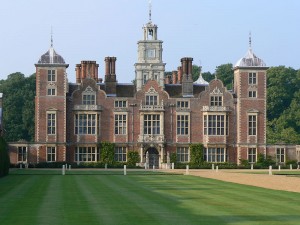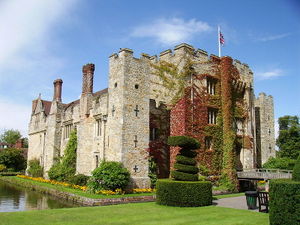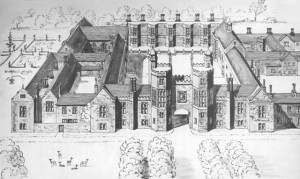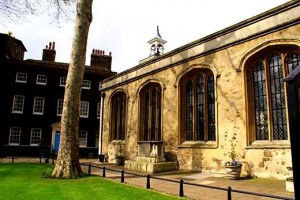George Boleyn was an important man in the Tudor court, yet he spent centuries in relative obscurity. The husband of an infamous wife, brother of a controversial Queen and uncle to a legendary one, George was always just the unfortunate victim in the downfall of his family. It wasn’t until the publication of The Other Boleyn Girl that George and his sister Mary were dragged from the shadows and into the cult of Anne Boleyn.
It is unlikely that many people would have even heard of historian Retha M. Warnicke’s controversial theory on George Boleyn’s sexuality in her 1989 book on Anne Boleyn, it was dismissed by most historians at the time, and harshly criticised by some. But then Philippa Gregory discovered it and used the theory as her basis for the conclusion for The Other Boleyn Girl. Had she not been such a popular author and had not it been such a convincing portrayal it may not have stuck. But not only did it stick, it evolved and it became increasingly negative.
I met Clare Cherry on an online history forum and her passion for George Boleyn inspired me. After sixteen years of working as a solicitor Clare took a break and ran a hotel with her partner, where she had more free time to start researching George Boleyn, and began work on her biography of his life. She is currently expanding her original manuscript with author Claire Ridgway.
I spoke to Clare about the creation of George Boleyn, the man, the myth and preserving his legacy.
Of all the Boleyns, how did you become interested in George?
I’ve been interested in Tudor history for a long while, particularly Elizabeth I, and Henry and his wives. I find Anne Boleyn the most interesting and have read a lot about her. But Anne had been written about countless times before, and has been well covered. Mary Boleyn holds very little interest for me and I have to say I don’t really understand the fascination with her. She had an affair with Henry and may or may not have had either one or two children with him. That’s about it really. As for George, he is usually a footnote. In fiction he’s usually dragged in at the last minute to die. Alternatively he’s usually depicted very negatively. Even in non-fiction he doesn’t feature that heavily. I then read Eric Ives’ biography of Anne in which George is given more prominence. Even here he’s not dealt with in any great depth, but there was enough about him to trigger an interest. He seemed to be an intelligent and brave young man who had been overlooked by historians, and I couldn’t understand why he is so often demonised when I couldn’t see a reason for it. That seemed to me to be terribly unfair, and I wondered whether, in fact, there was so little known about him that his character was simply made up for entertainment purposes.
Why did you decide to write a book about George Boleyn?
For my own interest I started reading the primary sources which Ives quoted. I found out there was a substantial amount of information about George and was surprised no one had ever written about him before. Initially I intended to write a pamphlet on his life, but I started to become a bit obsessed the more I learned about him. It ended up as a full length biography. I suppose if I had to sum it up in one sentence, my interest in writing a biography about George was motivated by a desire to do him justice.
What will we learn about George Boleyn from your book?
Claire Ridgway and I are working on the book together. My initial manuscript and Claire’s research are going to be amalgamated into a book which should be really thorough. Co-authoring the biography with Claire has added more detail and a new perspective from her own research.
The book deals with what little we know of George’s early life, but concentrates more on his career, in particular his political career, his involvement in the Reformation Parliament and his foreign embassies. There’s also a section on his position as Lord Warden of the Cinque Ports, and his reputation as a court poet. I believe he had an active involvement in the Schmalkaldic league, and there’s a section dedicated to that. As to what kind of person he was, I extract that from what others wrote about him and also his own letters which survive.
Have you come across anything in your research so far that may have changed your previous perspective on George?
Before I researched George all I had to go on was his depiction by Ives and in fiction. I had no idea how influential and powerful he was. My research has shown what a remarkable young man he really was. The more I learned about him the more impressed I became with his humour, intelligence, forcefulness and courage. I respected him far more than I had anticipated I would.
So, largely ignored by historians, George’s position at court has become increasingly diminished?
The one thing that impressed me the most, as well as surprising me, was just how dominant George Boleyn was. Because he’s normally just written about as a man in the shadows, and due to fictional depictions of someone who has no real role, I hadn’t realised just how powerful he was or how influential he was. The amount of evidence we have about him in primary sources is way over and above the amount I thought there would be. There’s a wealth of information about him that has never previously been collated and brought together to enable people to see who he really was.
The fact that we have so little information readily available on George Boleyn has, I think, allowed historical fiction to shape our perception of him, rather than fact. Do you hope to dispel some of the myths surrounding George?
I think the perception we have of George is almost entirely shaped by fiction. That is a particular bugbear of mine! Theories about George, which have no weight of evidence behind them, have been utilised in fiction to the extent that they are regularly taken as fact. The problem to date has been that there has never been anything in depth about George which could be used to dispel those perceptions. This book, I hope, will dispel many of those myths and perceptions by simply setting out all the available evidence we have about him from primary sources. The facts, from extant records, speak for themselves. It’s just that no one has previously done the exercise of collating everything out there about George into one book.
George’s wife Jane Boleyn has also got a bad reputation, although hers has a historical basis. While historian Julia Fox wrote a book that cleared Jane of sending her husband to the scaffold, a traditional concept, people seem to be unable to let go of Jane as a villain. Will you be looking at their relationship in your biography of George?
The book does look at George and Jane’s relationship, but the truth is that there is virtually no information about them as man and wife. I hear time and time again that they had a terrible relationship, but that’s just an assumption because of the long held belief that she gave evidence against him. The book also deals with the available evidence for her involvement in the trials, and it boils down to very little.
And finally, is there a question you would ask George Boleyn, if you could?
If I could ask George any question I think it would have been how he would see his life progressing in the event that he hadn’t been caught up in Anne’s fall? Would he have defended her or would he have acted as his father did and accept her guilt in order to save himself? Could he have carried on in Henry’s court knowing what had happened to his beloved sister?
___
Clare Cherry lives and works in Hampshire. She has contributed a wealth of information about George Boleyn on The Anne Boleyn Files, a website run by her co-author Clare Ridgway. Claire Ridgway is the author of two books on Anne Boleyn, The Anne Boleyn Collection and The Fall of Anne Boleyn, with a third book on the way.You can read Clare Cherry’s articles in the George Boleyn category on the Anne Boleyn Files.





No comments:
Post a Comment